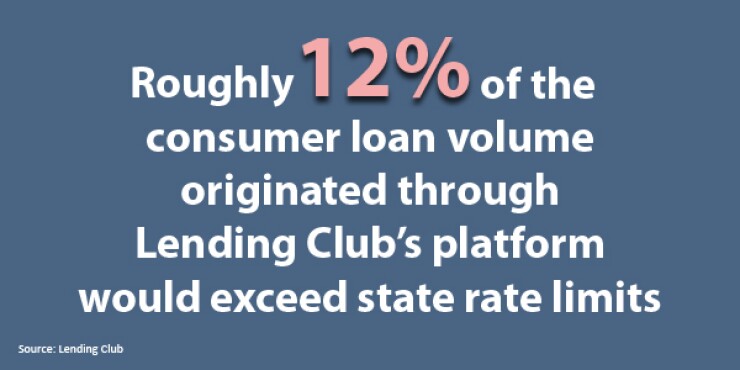-
If the decision by the New York appeals court is upheld, banks and other lenders could have trouble finding buyers for credit card and other consumer loans.
July 24 -
Because of a regulatory quirk, Lending Club and its competitors depend on banks to issue their loans. The set-up raises questions about the regulatory outlook for the fast-growing marketplace lending sector.
December 18

Marketplace lenders that have avoided state-by-state interest rate caps are gauging the potential damage from a court decision that is stoking questions about the long-term viability of their business model.
The May 22 ruling by a federal appeals court in New York triggered hand-wringing inside rating agencies, financial industry trade groups and law firms that represent lenders.
The court case involved the sale of charged-off credit card debt by a bank, but the 29-page opinion was broadly worded, sparking concerns about its potential impact on nonbank financial companies that rely on banks to issue their loans.
Companies like Lending Club and Prosper Marketplace use that set-up in order to avoid dealing with 50 different state-level licensing regimes. Lending Club and Prosper issue their personal loans through the $236 million-asset WebBank, which is based in Utah, a state that does not cap interest rates.
Although WebBank holds onto the loans for only a short time, the loans are subject to Utah law, rather than those of the borrower's home state.
[Coming this November:
On Tuesday, Lending Club disclosed that approximately 12.5% of its consumer loan volume, much of which is refinanced credit card debt, would exceed state interest rate limits if the company were forced to get state licenses.
That would appear to be the worst-case scenario for San Francisco-based Lending Club, which originated $1.9 billion in loans during the second quarter.
"So that certainly would be an impediment, and we'd have to revise our pricing in certain states, but that would be another option available to us," Chief Executive Renaud Laplanche said during the company's quarterly earnings call.
During a recent interview, Laplanche said it appears unlikely that Lending Club will have to get licensed at the state level. He called that the recent appeals court decision an isolated ruling, and argued even if the ruling is upheld, Lending Club still has adequate legal authority to rely on Utah law.
"I'm not overly worried that that framework would go away soon," Laplanche said.
Another executive in the marketplace lending industry, whose firm also relies on a bank partnership in order to avoid state interest rate caps, expressed similar doubt that the business model will be banned.
If that unexpected development were to materialize, "we do have a break-the-glass scenario," which involves relying on state licenses, the executive said.
"We would go back and do that. But it's just complexity for the business," the executive said.
It's not just marketplace lenders, sometimes known as peer-to-peer lenders, which rely on banks' unique ability to apply their home state's interest rate across the country.
Similar set-ups are frequently used in the private-label credit card business, and by a variety of nonbank consumer lenders that maintain their own balance sheets. For example, PayPal partners with Comenity Capital Bank on its credit line product known as PayPal Credit.
A number of nonbank lenders have opted to get state lending licenses, so they are not sweating the recent appeals court ruling.
Some of these companies offer lower interest rate products, such as student loans, that are less likely than personal loans to brush up against state interest rate caps.
San Francisco-based Earnest, which refinances student loans, is currently licensed to lend in around 40 states, according to CEO Louis Beryl. He said the company's decision to handle licensing in-house was a strategic one.
"We can't outsource that to a third-party financial institution, and then basically have to be constrained within whatever their box is," Beryl said. "We want to be in control our own destiny."
Social Finance, Inc., which offers student loans, personal loans, and mortgages, has also opted to get licensed at the state level. As a result, SoFi, as the company is known, will not be affected by the recent court decision.
Regarding the ruling's broader impact on the marketplace lending industry, Rob Lavet, SoFi's general counsel, said: "I think it's raised a lot of questions. I know there's been much concern about it. That said, I don't know if it will really directly affect the market."





